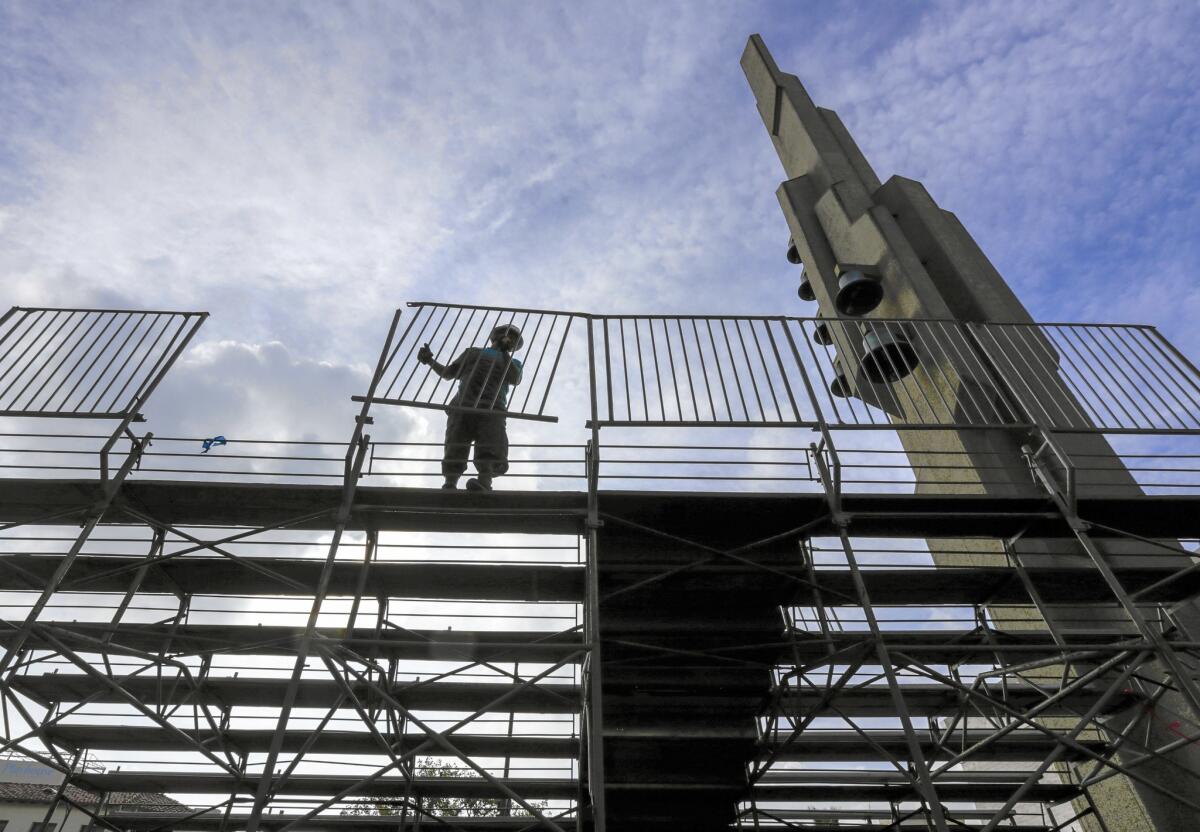What law enforcement officials are doing to keep the Rose Parade and Rose Bowl safe

Jesus Esquivel installs a fence on bleachers in front of Gospel Siloam Church on Colorado Avenue in preparations for the Rose Parade in Pasadena.
Protecting the Tournament of Roses Parade against terrorism has always been a daunting task.
The event draws an estimated 700,000 people who line a 5.5-mile route in Pasadena’s bustling shopping district. There are no gates of entry, and those who attend don’t need tickets and often bring along coolers, blankets and other items.
After the Sept. 11, 2001, terrorist attacks, official began heightening security measures, including flight restrictions over the parade, the use of mobile chemical monitors and more surveillance cameras.
But this year, federal, state and local law enforcement authorities are introducing new protections both along the parade route and the Rose Bowl game.
Officials stress there is no specific threat against the events. Rather, the increased security is due to a change in which federal officials declared the Rose Parade – along with a few other events such as the Super Bowl – as “rating 1” events where extra precautions are required.
That designation was made before the terrorist attacks in San Bernardino and Paris. But the effort is taking on added importance as officials focus more on terrorists who attack so-called “soft targets” where they can cause maximum casualties.
Many of the upgrades build off the Rose Parade’s longtime security plan: more cameras, more monitoring devices and more personnel looking for problems.
Mark Selby, Homeland Security’s deputy special agent in charge, said the agency for the first time will use a massive scanner that can examine trucks coming into the area near the Rose Bowl.
Homeland Security will also have technology capable of tracking cellphone calls in the Pasadena area. Officials have a plan to immediately seek court warrants if they need to monitor phone activity, Selby said.
There will be heavily armed rapid response squads hiding in the wings, undercover agents mingling in the crowd and devices capable of detecting small amounts of radiation.
License plate readers across the area have gathered data in search of suspicious activities. At the Rose Bowl, game ticket holders will be given clear bags for their possessions.
To supplement the usual 1,000 or so Pasadena police officers and Los Angeles County sheriff’s deputies, two dozen federal agencies will be working at the parade.
“This will be the largest security operation in the parade’s and bowl game’s history,” Selby said. “Thanks to a deployment of new technologies, we will have the ability to watch the entire route and if the worst happens respond rapidly with force.”
See more of our top stories on Facebook >>
Brian Levin, director of the Center for the Study of Hate and Extremism at Cal State San Bernardino, said the Dec. 2 San Bernardino shootings are likely to prompt security officials to focus more on potential West Coast targets.
“While technically (Homeland Security) uses a multifactored test that looks at everything from available assets to event size, the East Coast, and New York and Washington, D.C., in particular, until now, were regarded as facing a disproportionate threat risk,” he said. “In the past, most of these events had an eastern focus.”
Married couple Syed Rizwan Farook and Tashfeen Malik killed 14 people at a holiday party at the Inland Regional Center. They were later killed in a shootout with police. Authorities say both were “self-radicalized,” but that it’s still unclear what links — if any — they had with Islamic terrorist groups.
Pasadena Police Chief Phillip Sanchez said San Bernardino underscored the need for close communication with federal authorities.
“There [are] lessons to be learned out of any situation… let me be clear my biggest concern is a lone wolf, nonstate actor,” he said. This kind of threat, he said, is the most difficult to detect through intelligence.
But Sanchez said that is where the public can help.
“It is crystal clear to me that in every incident we have seen over the last decade; somebody knew something in advance of the situation. We have seen that in San Bernardino,” Sanchez said. “So I would implore our community members…you have the real authority, you have the capacity to detect” terror plots.
Times staff writer Matt Stevens contributed to this report.
Twitter: @LAcrimes
ALSO
San Diego police say 400-pound bearded woman stabbed man
‘Winter vomiting disease’ on the rise in California, officials say
After San Bernardino massacre, U.S. poet laureate writes in hope
More to Read
Sign up for Essential California
The most important California stories and recommendations in your inbox every morning.
You may occasionally receive promotional content from the Los Angeles Times.










